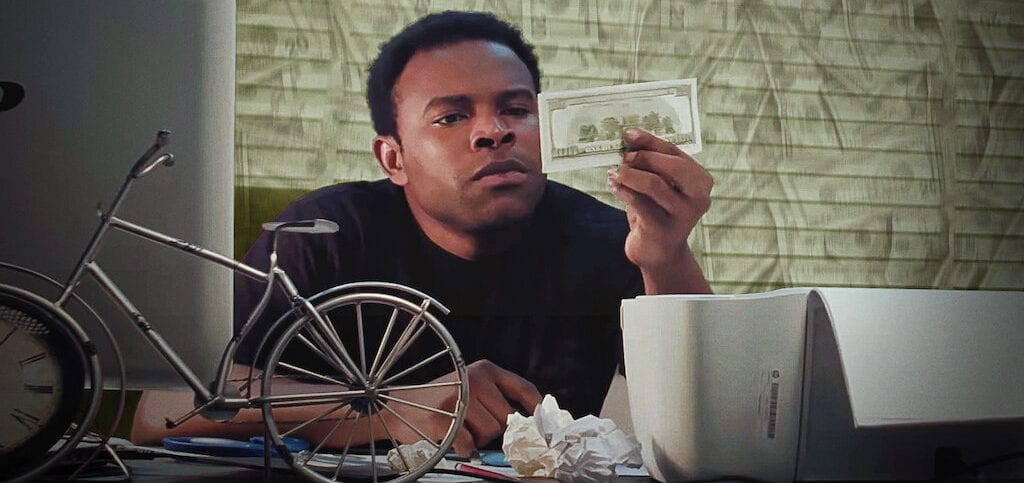Reviewed by Jeffrey Sanzel
Released in 2019 and now available on Amazon Prime, Coming from Insanity is the true story of Kossi the Bear, the notorious currency counterfeiter.
The film was much anticipated and is considered a major addition to the Nollywood film world. (The controversial term “Nollywood” was coined in the early 2000s, traced to several possible New York Times’ origins. While there are several meanings, it most specifically refers to the film-making activity in Lagos, Nigeria.)
In 1995, Kossi, age twelve, was trafficked from Togo to Lagos, a common fate for thousands of children. The majority of these victims became servants, with approximately one percent involved in criminal activity. Sold into domestic slavery by his parents, Kossi serves as a house boy for the Martins, whose treatment ranges from disinterestedly kind to emotionally brutal. The film quickly jumps fifteen years to his ejection from the house. The family gives him severance and a plane ticket back to Togo, where he knows no one and has no connections.
Instead of returning to his birthplace, he embarks on a career as a counterfeiter. His obsession with making money leads him to the actual concept of “making money.” He masters the ability to create almost undetectably realistic American one hundred dollar bills. He sets up shop in a well-appointed apartment with three ragtag assistants and begins to produce huge quantities of the faux cash. At the same time, they begin living the high life, with drinking and clubs and partying of all sorts. Eventually, they run afoul of both Nigeria’s Economic and Financial Crimes Commission (EFCC) and a dangerous and violent band of illegal moneychangers.
After the extended exposition, the simple plot kicks into high gear. The characters are fairly broad sketches, with the most depth reserved for Gabriel Afolayan’s Kossi, whose focus and genius contrast with immaturity and an almost painful innocence. Watching him try to find the right paper for printing the false bills is one of the stronger stretches in the film’s earlier parts. “Practice makes good,” he states. “Obsession makes perfect.” And yet, his limited life experience leads him into cavalier and, ultimately, deadly choices. His passion for Sonia, whom he calls Mama Bear, is more high school crush than an adult connection.
Most of the actors have been given one tonal quality, but they make the most of this. Udoka Oyeka’s Detective Toye is described as being brilliant but having a personal life on-the-rocks. The latter is only revealed through him occasionally drinking from a hip flask; it is more indicating than inherent. But he has an ease and clarity that reads strongly in his drive to bring down the counterfeiters.
Adeolu Adefarasin is gentle and wise as an older house boy who comes along and is often the voice of logic and wisdom. Entering later in the film, Bolanle Ninalowo brings depth to the bouncer-turned-bodyguard Rocky. Sharon Ooja, as Sonia, the object of Kossi’s affection, manages to balance the mercenary with the kind. Odunlade Adekola has a brief but memorable scene as a loquaciously aggressive cab driver. As a whole, the cast does its best, but the film leans towards plot rather than character-centric.
Writer-editor Akinyemi Sebastian Akinropo makes his directorial debut with this feel which feels like a sketch for a more complicated and deeper exploration of the topic in some ways.
While it has the feeling of a low-budget film and multiple plot holes must be overlooked, Akinropo has created an intriguing and entertaining crime thriller; he tells the story with sympathy and humor and a true sense of humanity. The gritty reality juxtaposed with some surprising and almost eccentric touches raise the film above the average.
Coming from Insanity is a fascinating story told unevenly but with honesty and just enough originality to keep the viewer engaged. The film is rated PG-13.







